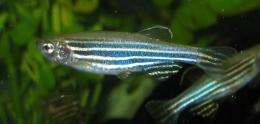November 9, 2012 report
Study identifies how zebrafish regrow their brains

(Medical Xpress)—An international team of scientists has discovered the mechanism by which zebrafish can re-grow brain neurons after they have suffered traumatic brain injury, and that this mechanism is associated with inflammation.
The zebrafish (Danio rerio) is a small tropical freshwater minnow native to the Himalayan region. Zebrafish are common aquarium fish, and they are often used in research on genetics, cancer, and vertebrate development. They are also commonly used in scientific research because of their ability to regenerate tissues and organs such as brain, spinal cord, skin, fins, and heart after traumatic injury. Until now scientists have known the fish could regenerate their brains, but have not understood the mechanism.
The research team, led by Nikos Kyritsis, of the DFG Center for Regenerative Therapies Dresden (CRTD), Germany, injected a range of molecules likely to produce an immune response into uninjured zebrafish brains to try to trigger the regeneration response. One of these molecules, leukotriene C4 (LTC4), caused the brain to create new neurons. LTC4 is a ligand for the protein Cysteinyl Leukotriene Receptor 1 (Cystlr1), which the team found was expressed in the inflamed brain, and its presence was critical for neuron regeneration.
According to Kyritsis and colleagues, their findings suggest that inflammation in zebrafish brains is coupled with an LTC4 signaling cascade in the radial glial cells, which promote growth of new neurons, and this enables the fish to replace damaged neurons.
In humans inflammation is considered harmful and likely to interfere with regeneration, one of the researchers said. Jan Kaslin, a neurobiologist from Monash University in Victoria, Australia, said the surprising finding of the team's research was that inflammation was actually beneficial in zebrafish and provided a "kick-start" for the regeneration process.
In humans, chronic inflammation, such as that often produced after a stroke, is associated with brain scarring and can result in the development of neurodegenerative conditions such as Alzheimer's and Parkinson's diseases. There is some neural regeneration, but in humans and other mammals it is not sufficient to replace all the damaged neurons.
The new study suggests that acute inflammation, such as that produced after a mild head injury, might be best left to run its course rather than being treated by anti-inflammatory drugs such as aspirin or ibuprofen. Recent recommendations are that these drugs should also be avoided in mild brain injury because of a possible risk of causing bleeding in the brain.
In the paper, published in the journal Science, the authors suggest their discoveries could eventually have an application in treating brain injuries and neurodegenerative conditions in humans, but much more research is needed, first in mice and then in human brain tissue.
More information: Acute Inflammation Initiates the Regenerative Response in the Adult Zebrafish Brain, Science, DOI: 10.1126/science.1228773
ABSTRACT
The zebrafish regenerates its brain after injury and hence is a useful model organism to study the mechanisms enabling regenerative neurogenesis, which is poorly manifested in mammals. Yet, the signaling mechanisms initiating such a regenerative response in fish are unknown. Using cerebroventricular microinjection of immunogenic particles and immunosuppression assays, we show that inflammation is required and sufficient for enhancing the proliferation of neural progenitors and subsequent neurogenesis by activating injury-induced molecular programs that can be observed after traumatic brain injury. We also identified the cysteinyl leukotriene signaling as an essential component of inflammation on the regenerative process of the adult zebrafish brain. Thus, our results demonstrate that in zebrafish—in contrast to mammals—inflammation is a positive regulator of neuronal regeneration in the central nervous system.
© 2012 Medical Xpress
















